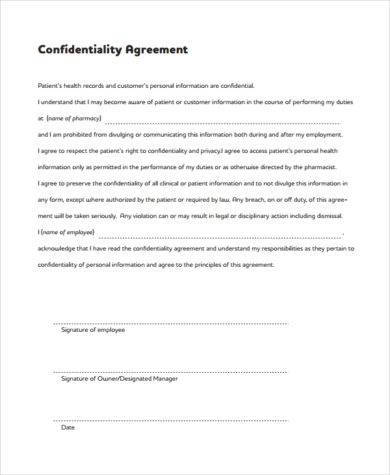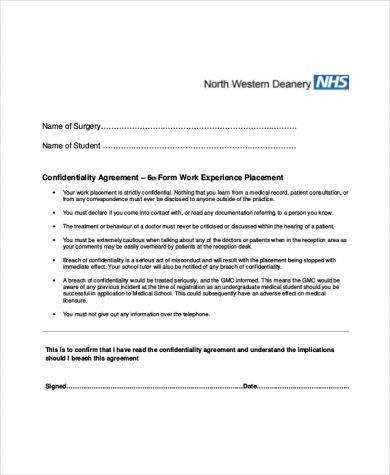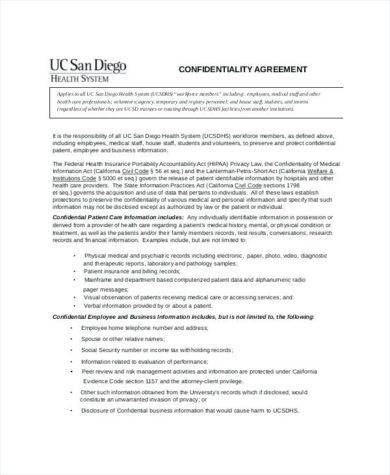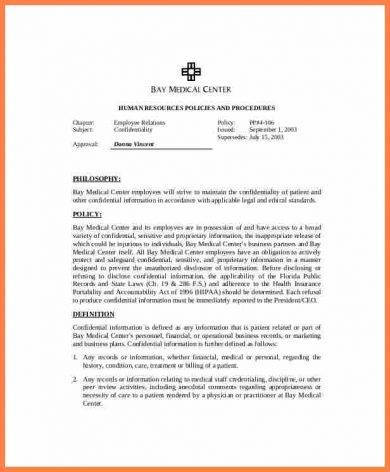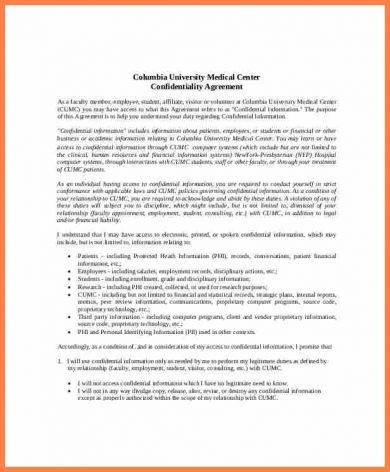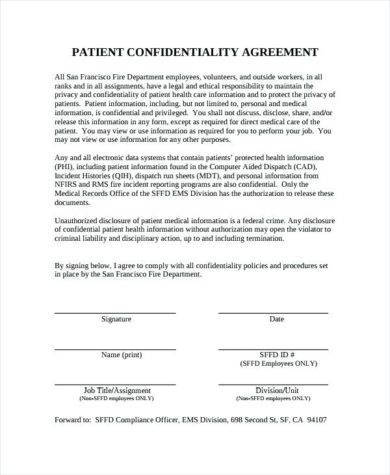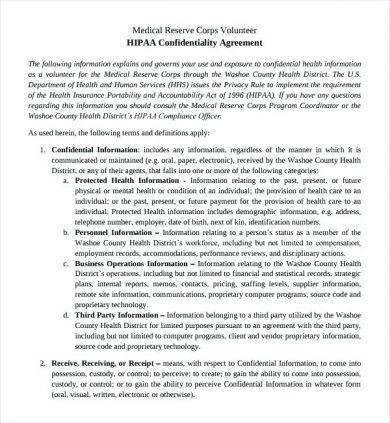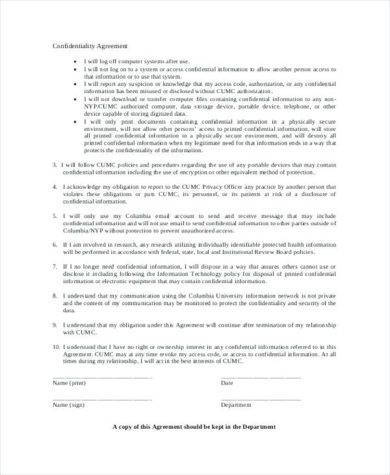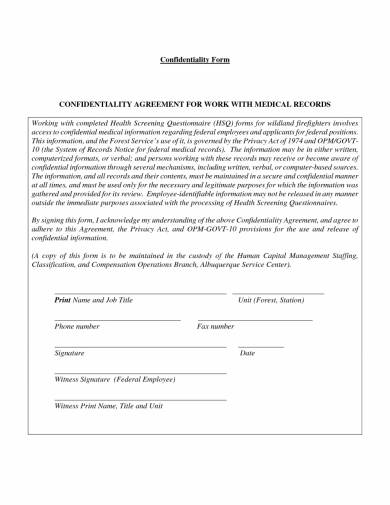9+ Patient Confidentiality Agreement Examples
Confidentiality is one of the main foundations that can create trust and openness between a patient and his doctor, which is important because without it, free flow of information will not be made possible. A patient can only fully surrender himself to thorough scrutiny and investigation to a medical practitioner if he knows that he is in safe and trustworthy hands. You may also see mutual confidentiality agreement examples.
- 9+ Non-Disclosure Confidentiality Agreement Examples
- 10+ Employee Confidentiality Agreement Examples
The private feelings and personal history of a patient are important to make a physician understand, diagnose, and treat him effectively and thoroughly. There should be a consented full disclosure between the parties involved. To decide on the type of medical treatment that will be used on a patient, the doctor will have to know about his history. You may also like HIPAA confidentiality agreement examples.
Patient Confidentiality Agreement Example
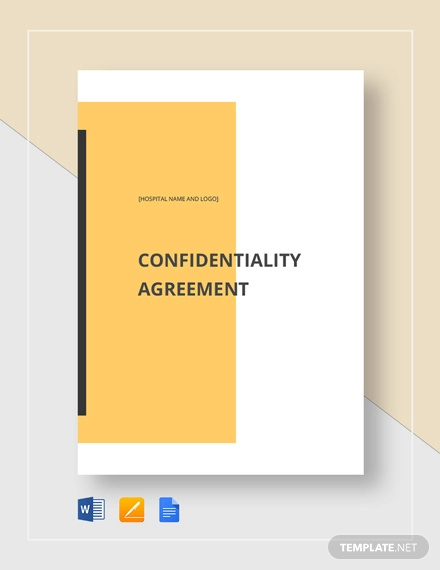
Patient Confidentiality Agreement Template
Fillable Patient Confidentiality Agreement
What is the patient’s lifestyle? What are the medical problems he has experienced before? What are the medical problems he is going through now? Without these important details, a physician may not be able to help the patient as well as he could because he doesn’t have a full grasp on the problem at hand. You may also check out non-disclosure agreement examples & samples.
UC San Diego Confidentiality Agreement Example
Letting the doctor get a vivid and detailed description of every aspect of a patient’s life that may have a direct impact on his health—such as his habits and routines—is the key to successful treatment. This is why it is paramount that a patient chooses a doctor he is comfortable with. Otherwise, discussing his personal business may be difficult, thus, making the treatment ineffective. You may also see business agreement examples.
Patient confidentiality must be protected for it to be continually encouraged by patients who have the right to conceal any information they believe to be too personal to share. Communication between physician and patient are now protected by the constitutional rights of the latter. Although this immunity is not absolute, the parties involved may apply for legislative action as a privilege given to them by law. You may also like printable agreement examples.
What Is HIPAA Security and Privacy Rule?
The Health Insurance Portability and Accountability Act was legislated by the American congress as a part of their attempt to improve the efficiency of the American health care system. It centers on the importance of protecting sensitive patient information. You may also check out non-compete agreement examples.
The HIPAA covers all healthcare provider that electronically transmits patient information—individuals, organizations, institutions even those that are focused on research, and government agencies.
HIPAA requires all the entities aforementioned to safeguard health information, which is not only limited to protecting the data but also its integrity and accessibility. Noncompliance may result in fines ranging between $100 to $50,000 per violation in one calendar year. Aside from this, the individuals that will be proven guilty will be held criminally liable. You might be interested in agreement examples in PDF.
Offenses caused against the HIPAA will fall under the jurisdiction of the US Department of Justice, can lead to imprisonment of up to 10 years.
Medical Center Confidentiality Agreement Example
Confidentiality Agreement Document Sample
Patient Confidentiality Agreement
What Are the Rules Set by the HIPAA for Patient Confidentiality?
1. Technical
- Access to patient data includes the ability to read, write, modify, and communicate its contents. It should be restricted by unique user identifiers and automatic logoffs to make sure that the information will not be obtained by anyone outside of the direct parties involved. You may also see sales agreement samples.
- There should be policies and procedures to be followed pertaining to the protection of the information against alteration or elimination by an unauthorized person.
- There should be a verification required for any person who tries to gain access to the data.
2. Physical
- There should be limited access to facilities where all house data are stored. There should also be processes for restoring lost data, security plan for the facility, and maintenance records of the facility.
- Workstation etiquette for anyone who has access to any patient data should be strictly observed. This may include restrictions for computer use. You may also like license agreement examples.
- There should be security personnel that can protect work stations from unauthorized access. This may include a secure room that is accessible only for approved personnel.
- There should be severe rules regarding the removal of the data, both physical and electronic, from the facility. You may also check out what is a business agreement.
3. Administrative
- The administration should conduct a risk analysis and prepare a risk strategy plan to prevent, detect, and correct violations.
- A security official must be designated to implement the rules and policies.
- The staff who are given access to patient information should be validated and supervised.
- A security incident must be planned and prepared for situations when it is needed.
- A contingency plan must always be ready for emergency situations, especially in cases where data has been defiled or destroyed. You may also see service level agreement examples.
- A regular evaluation of the implemented security plans must be conducted to ensure that it is in continued compliance to the HIPAA rules.
- It is required that all parties involved have a written general agreement or contract created with respect to the HIPAA security and privacy rules.
What Is a Patient Confidentiality Agreement?
A patient confidentiality agreement is a contract between at least two parties. It encompasses confidential material, information, or knowledge about the patient’s current medical condition and history that the entities involved want to divulge to one another but wish to keep from third parties. It is a legal document signed by both factions as a settlement to not disclose information as specified in the agreement.
It is also a simple agreement that whatever information stated during a conversation between the doctor and his patient will not be used against the latter in any way.
Scopes of a Patient Confidentiality Agreement
1. When a patient confesses to a psychiatrist that he has committed a particular crime or any criminal act deserving of a legal punishment, no matter how small, cannot be used by the psychiatrist against him. You may also see consulting agreement examples.
2. A doctor who has signed a confidentiality agreement cannot communicate any information said to him in secret that may ruin the patient’s credibility.
3. If an underage teenager comes to a doctor to profess being a sexually transmitted disease-positive patient, the doctor may want to contact those that the patient has performed sexual acts with so that they will also be checked.
However, the patient may not divulge any name for the fear that they will be charged with statutory rape. If the parties have signed a simple confidentiality agreement, they cannot be forced to open the information to anyone, except to organizations or individuals who are associated with the case.
HIPAA Confidentiality Agreement
Terms of Patient Confidentiality Agreement Example
Confidentiality Agreement for Medical Records
Common Issues Discussed in a Confidentiality Agreement
1. The parties involved, their complete names, and position in the basic agreement, whether they are the receiver of the information or the recipient of it;
2. A laundry list of the things and information that should be kept private and confidential. It is important to create a detailed list of this to make sure that both parties are agreeing on the same things;
3. The period or time span that the non-disclosure agreement covers;
4. The exclusions, if there are any, of what must be kept confidential.
This clause usually includes any information that the recipient already has prior knowledge of, any subsequent information that the recipient has gained from another source; any information that is available to the general public, any information subjected to subpoena (however, this detail should be agreed upon further by both parties as there are differences in the way practitioners regard this certain case). You may also see business sale agreement examples;
5. The time period of the confidentiality;
6. The time period wherein the agreement will be considered legally binding;
7. A thorough description and discussion of the things needed to be done and observed regarding the information after the agreement has ended. You may also like conciliation agreement examples;
8. The responsibilities of the recipient regarding the sensitive information which may include only using it for specified, listed purposes, disclosing the data only to people mutually agreed by the parties and only in cases when they absolutely need to know, exerting appropriate efforts and means to keep the information secure, making sure that the individuals to whom the information has been disclosed will abide by the standard agreement;
9. A thorough description and discussion of any permitted disclosure;
10. The law and jurisdiction to which the agreement and the parties involved will be subjected to. This is also a matter of importance because standard confidentiality agreements differ between states and jurisdictions, so the parties should choose the legal authority they will abide to.
A confidentiality agreement between a patient and his doctor eases any uncertainty in the part of the former to be completely honest to the latter, for the fear that his behavior will be reported against him.
As aforementioned, without complete, unbounded honesty, the treatment process may be more difficult or, most importantly, inaccurate. Both parties must agree to be truthful and trustworthy toward each other and, oftentimes, professionalism is not a sufficient assurance. A patient confidentiality agreement can be signed by those involved.



